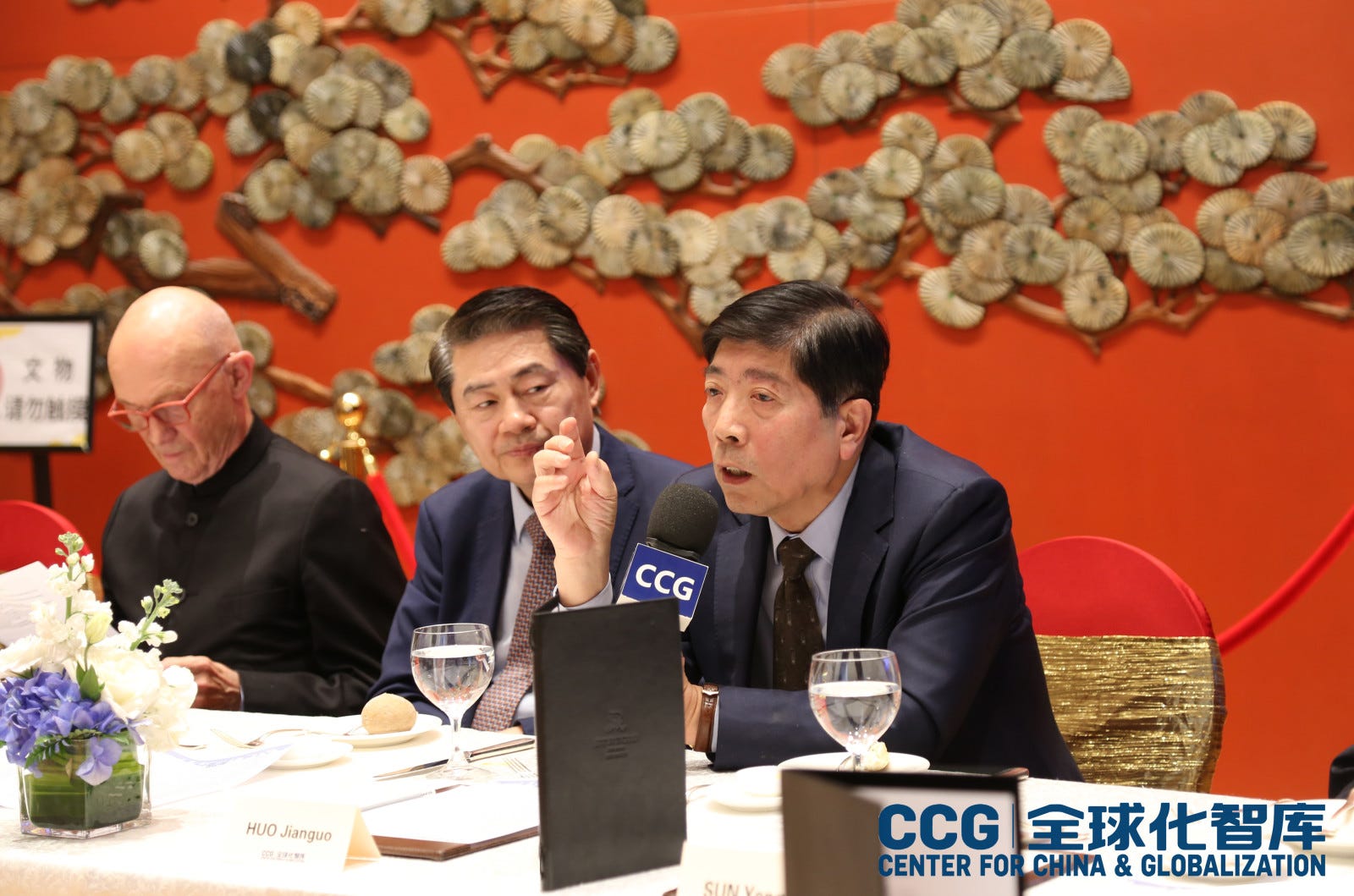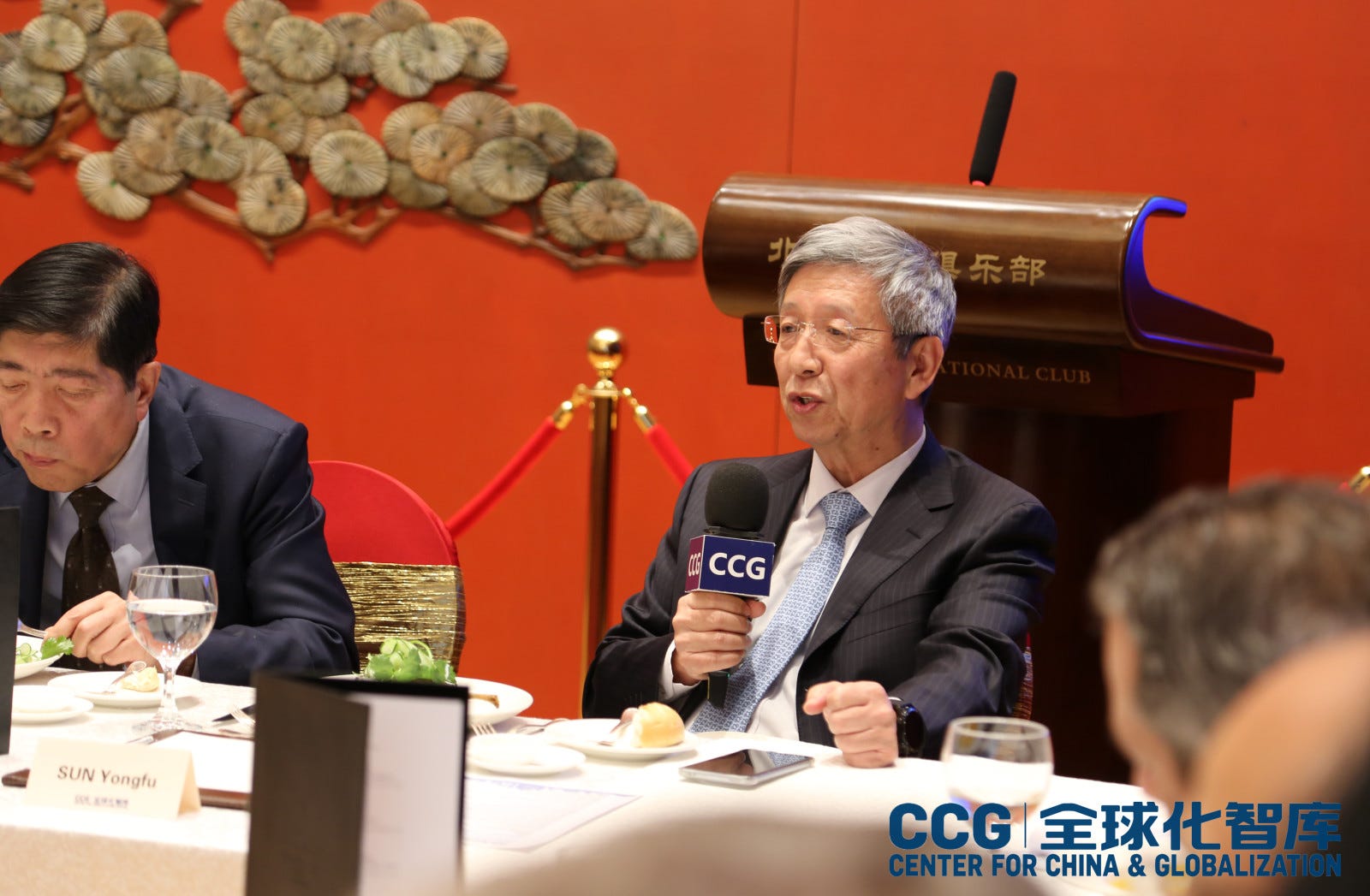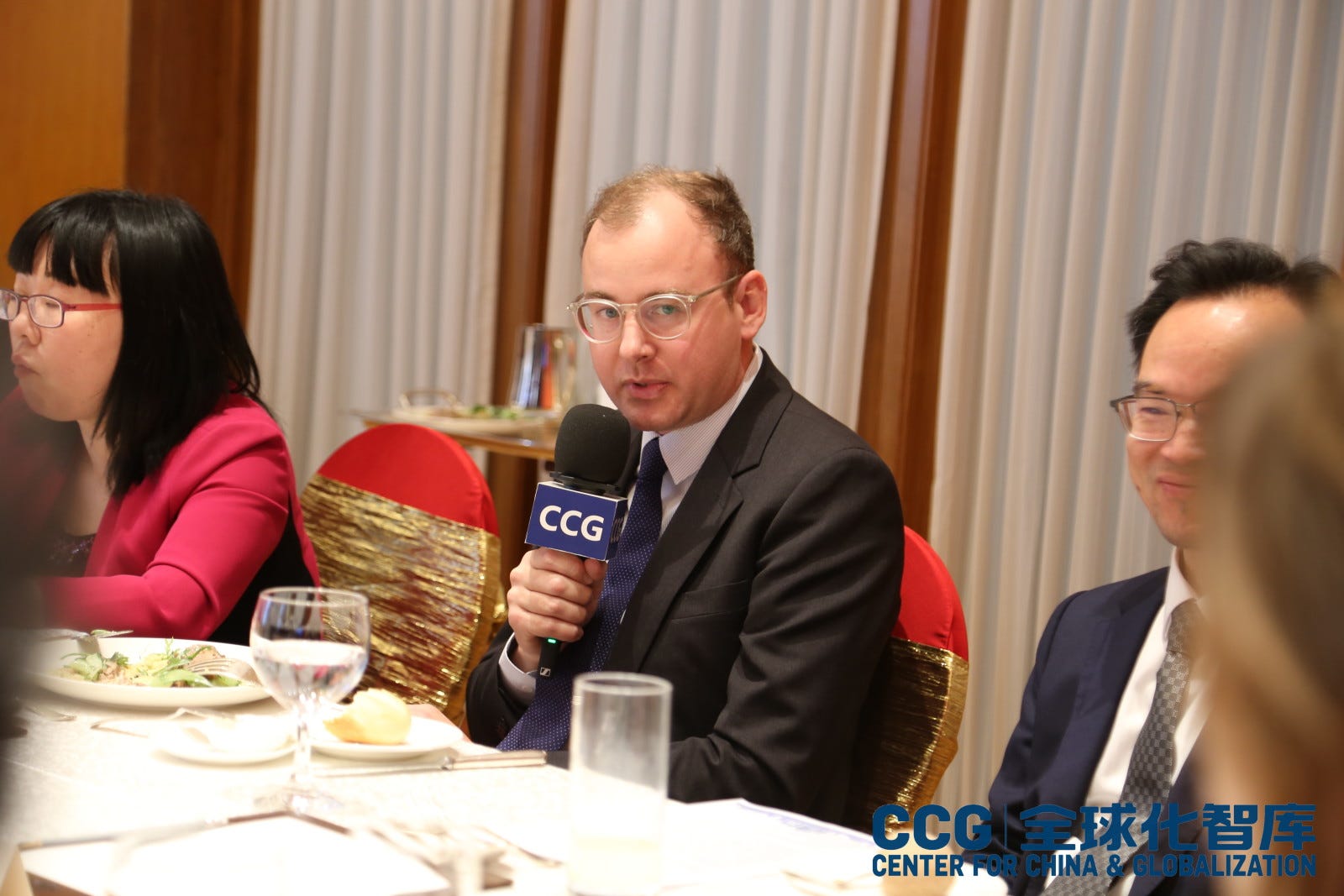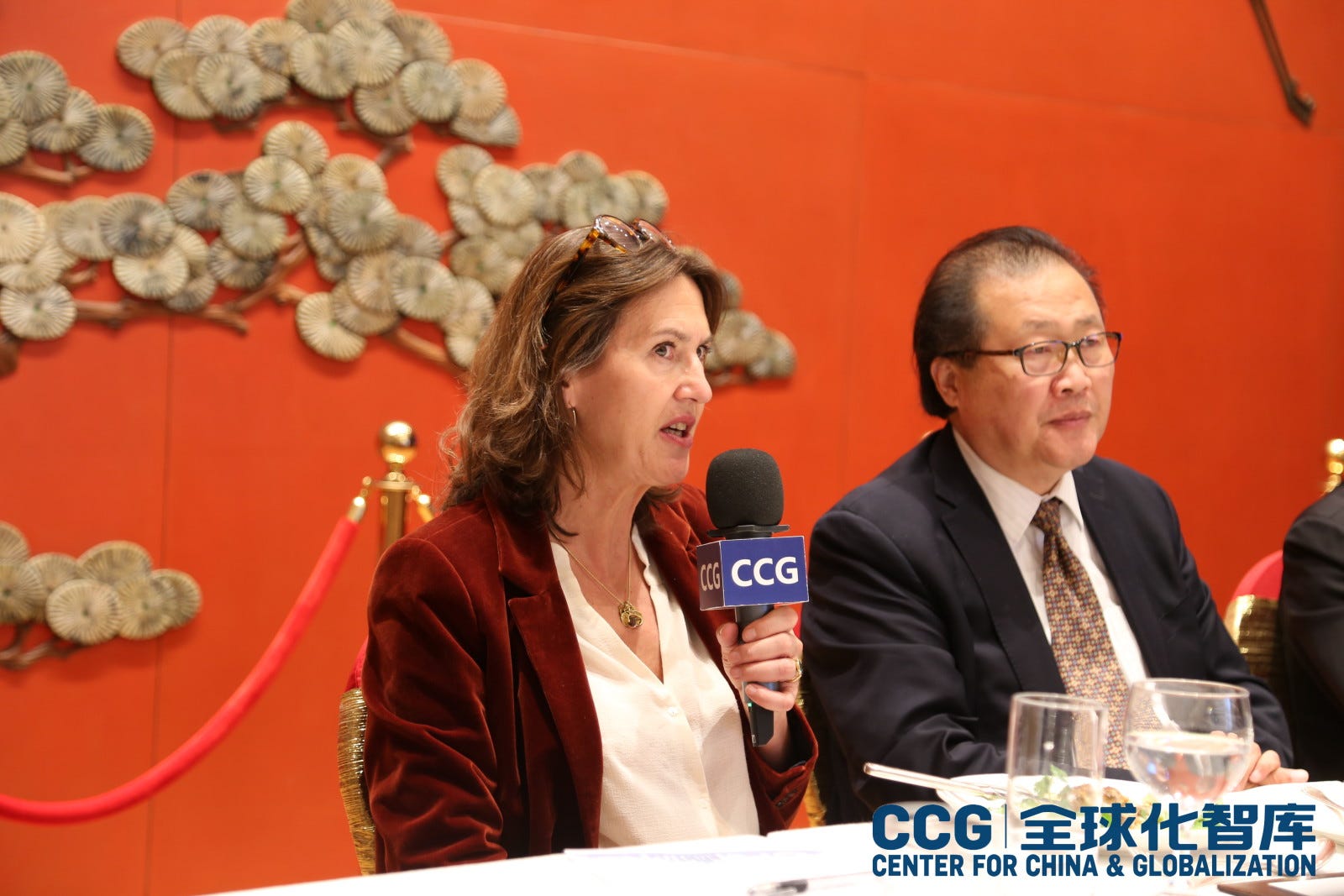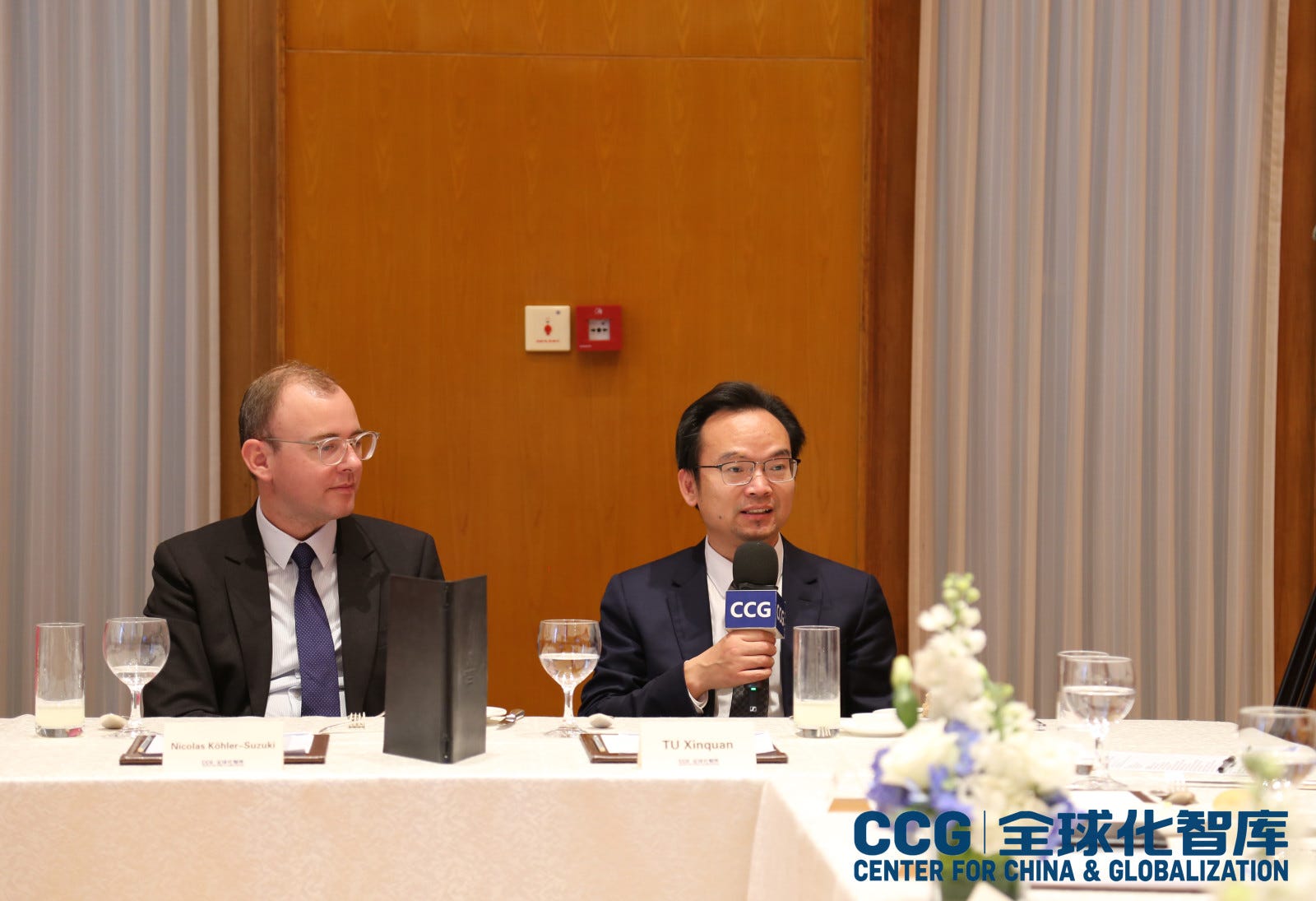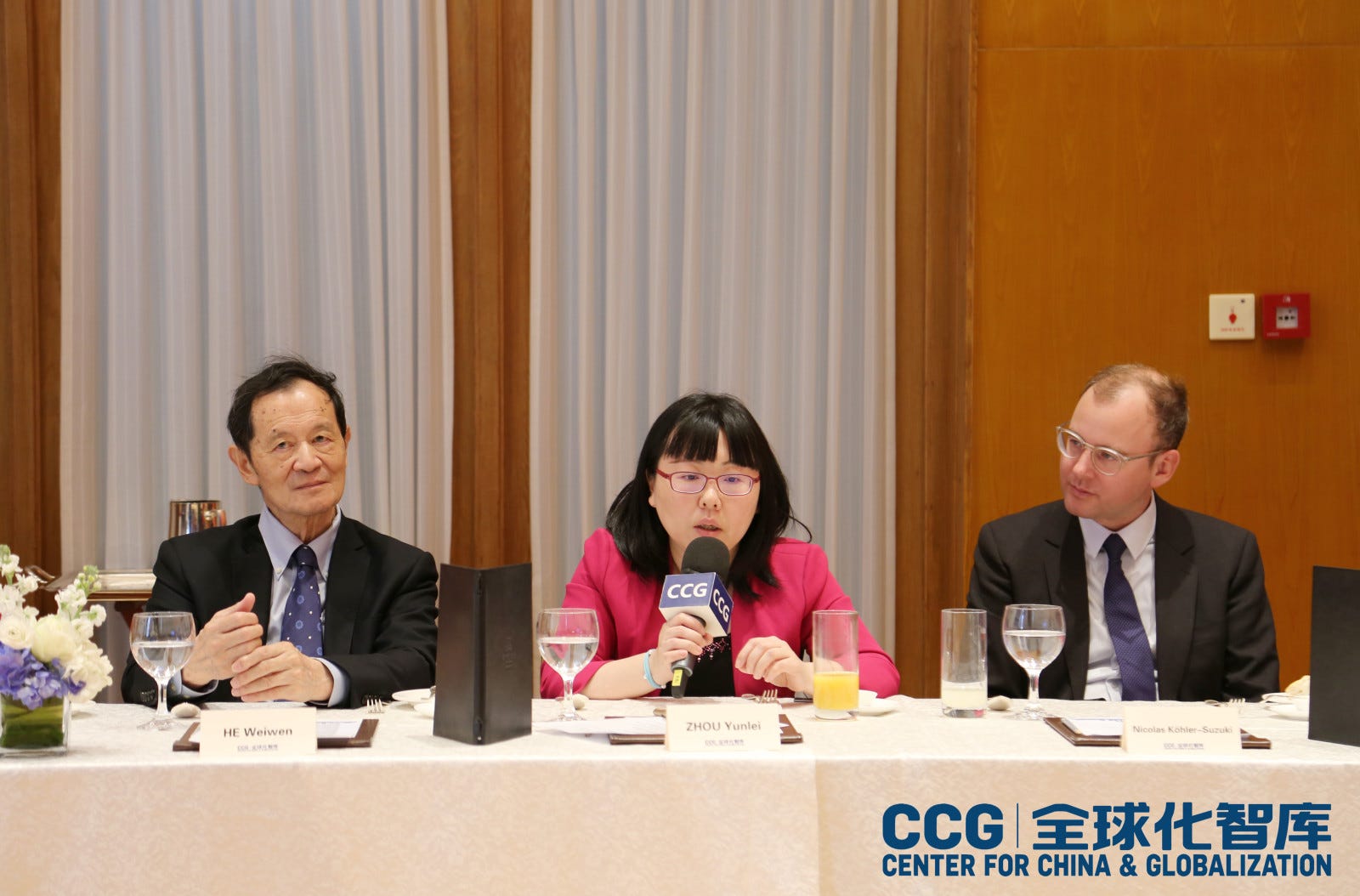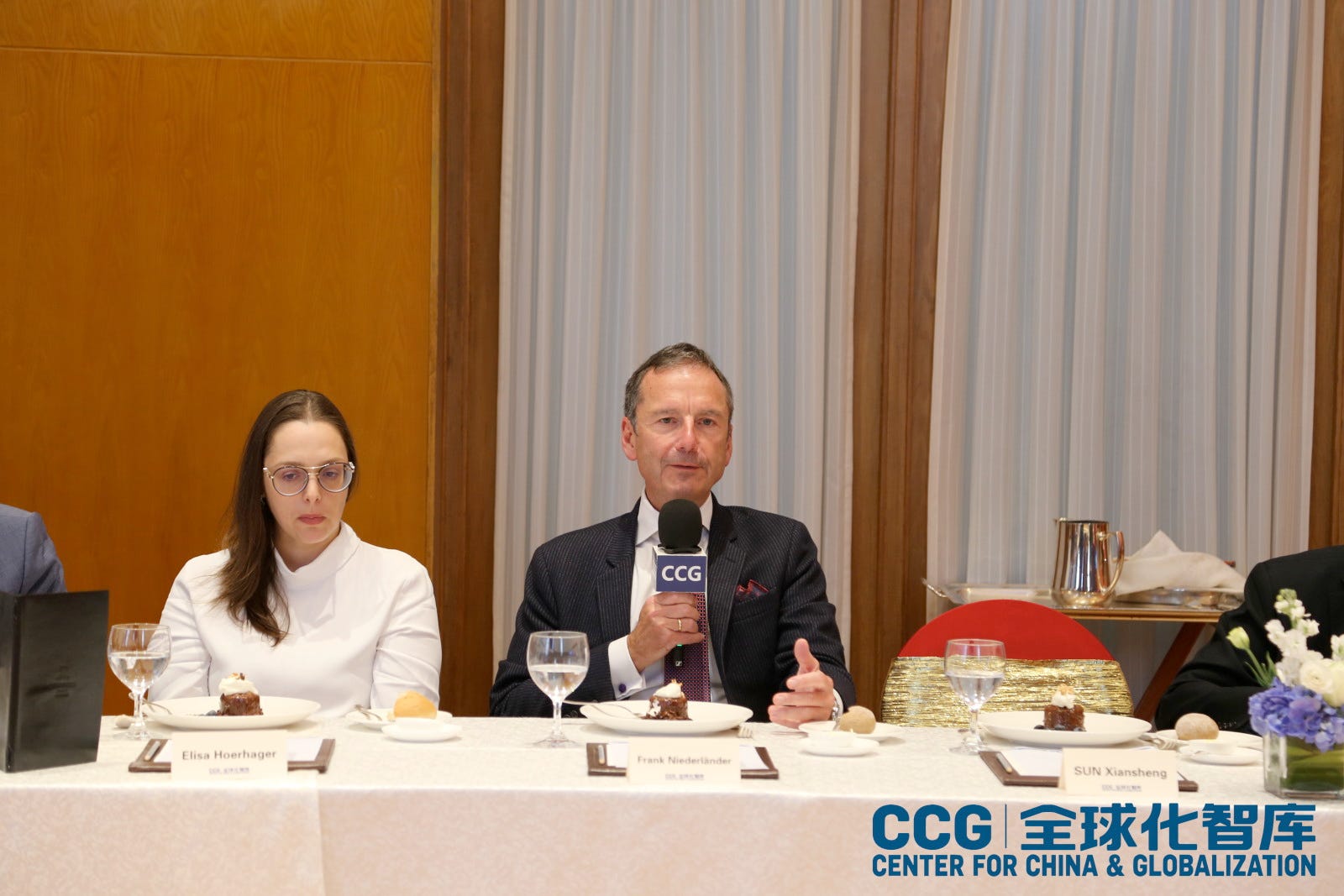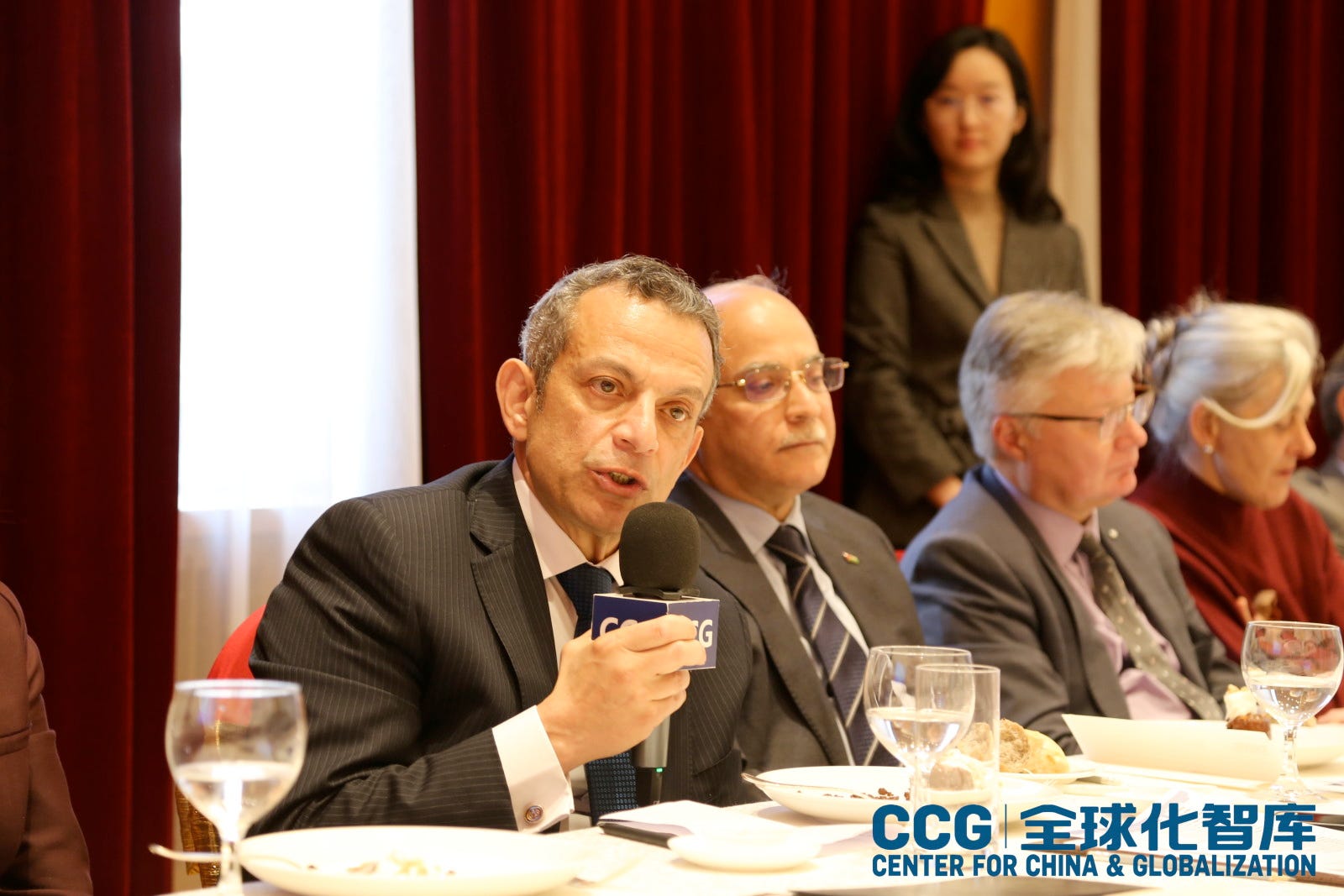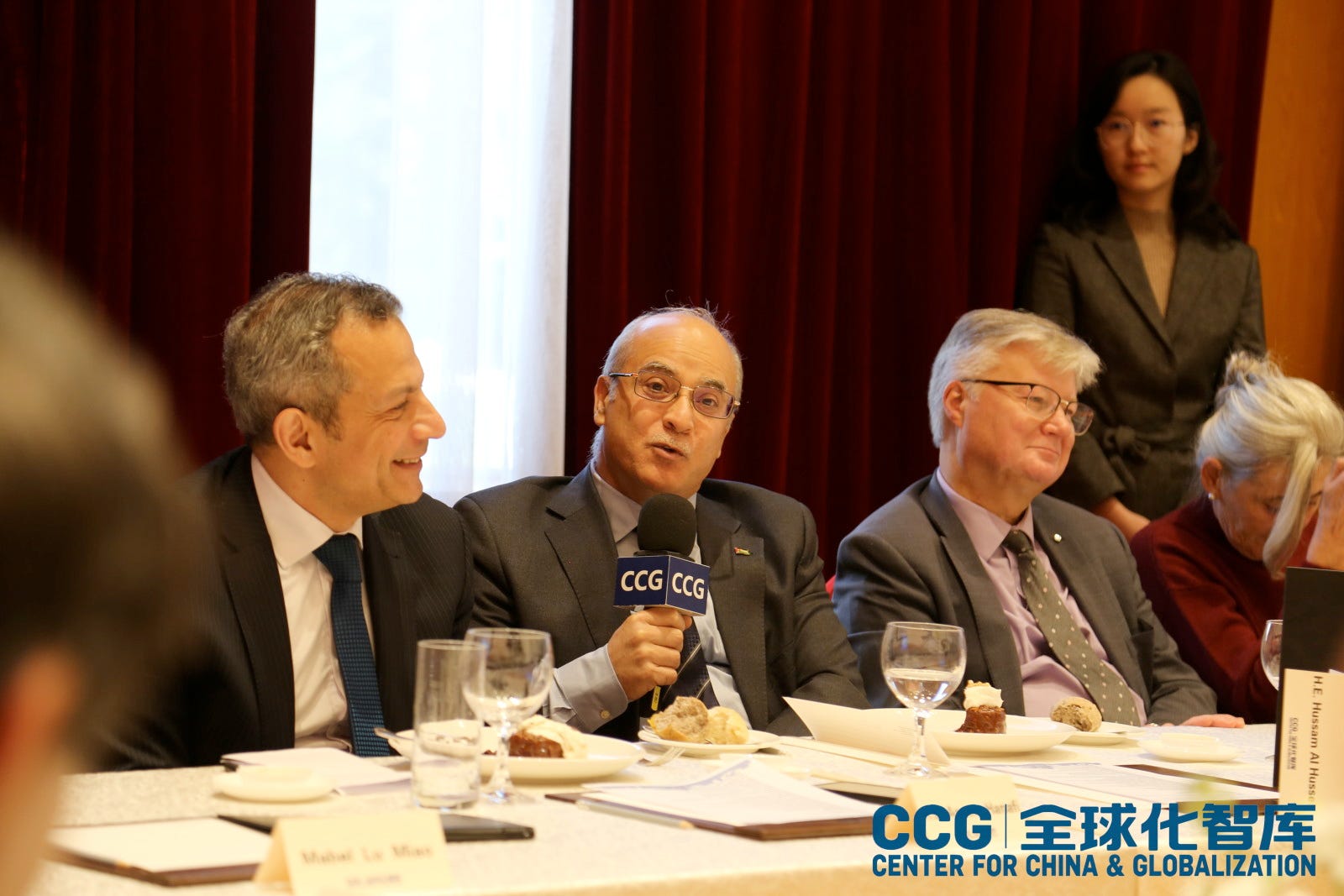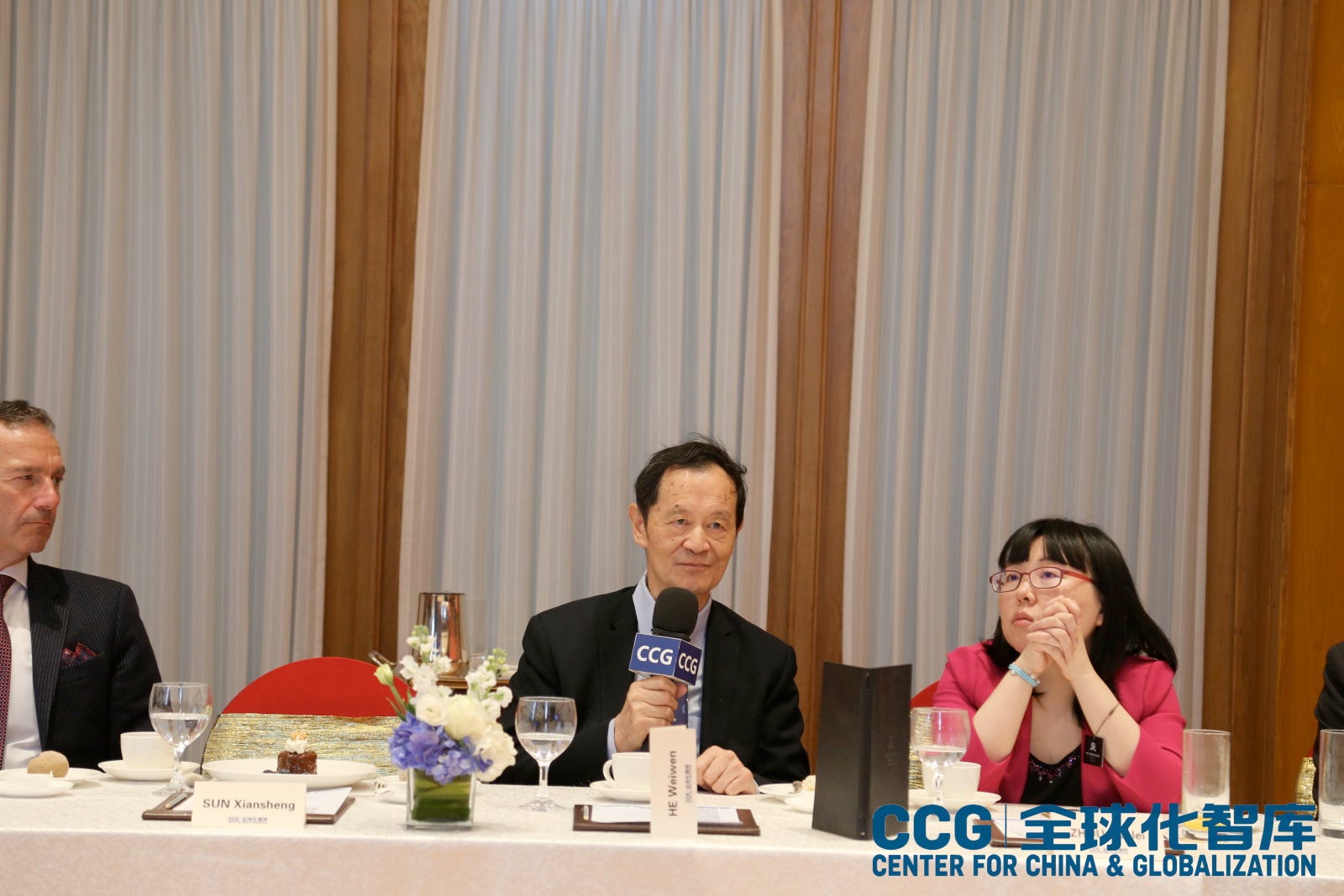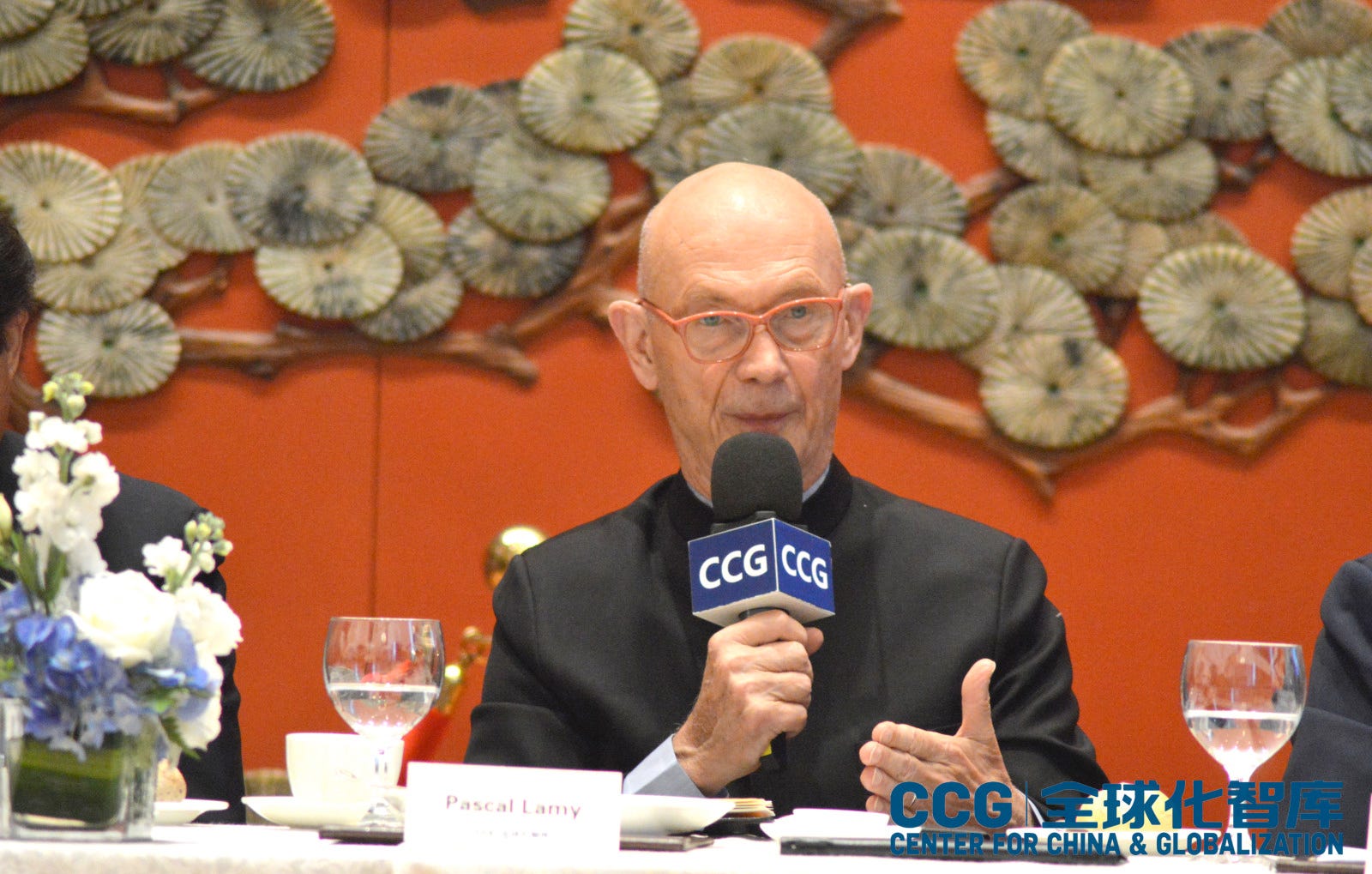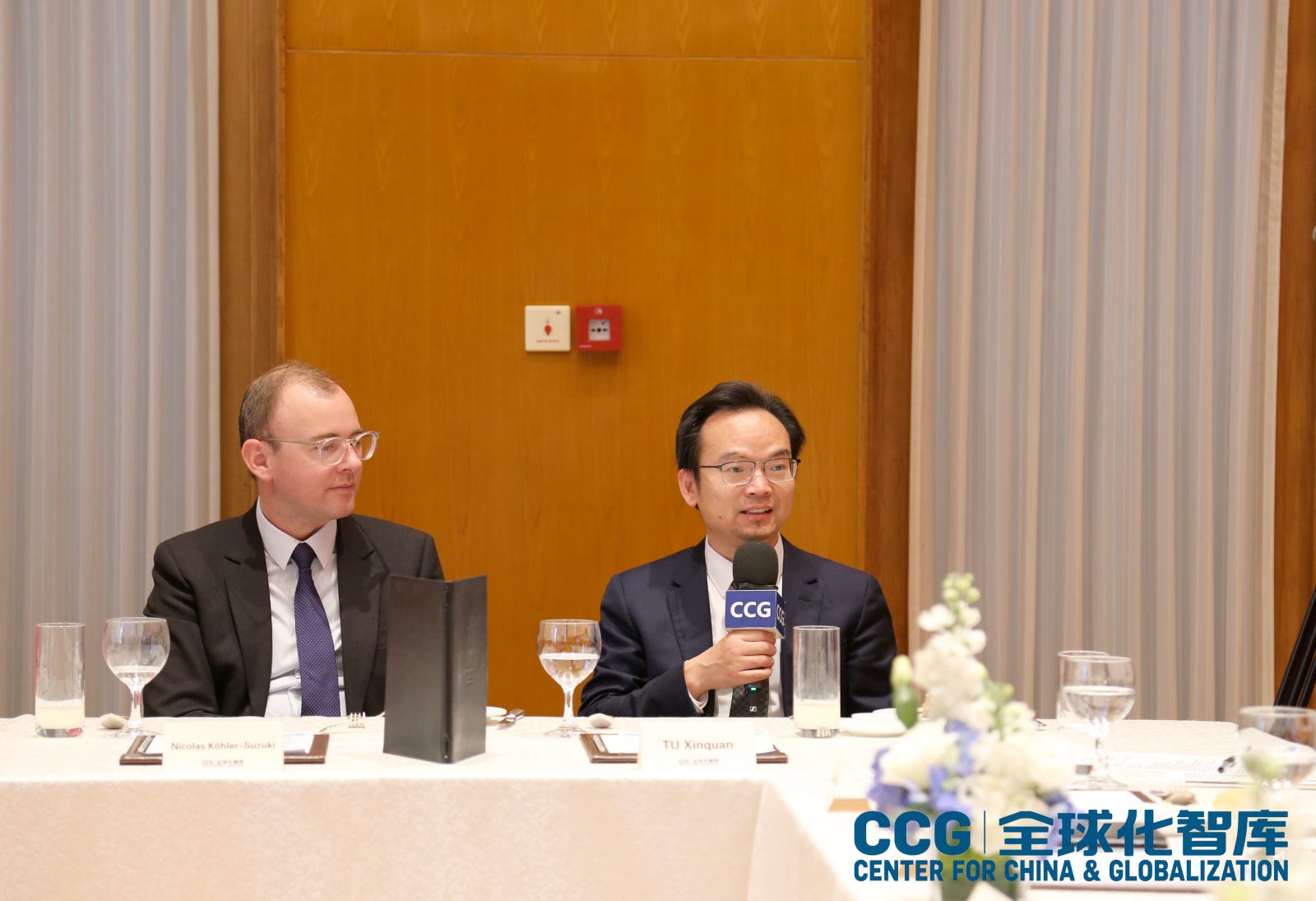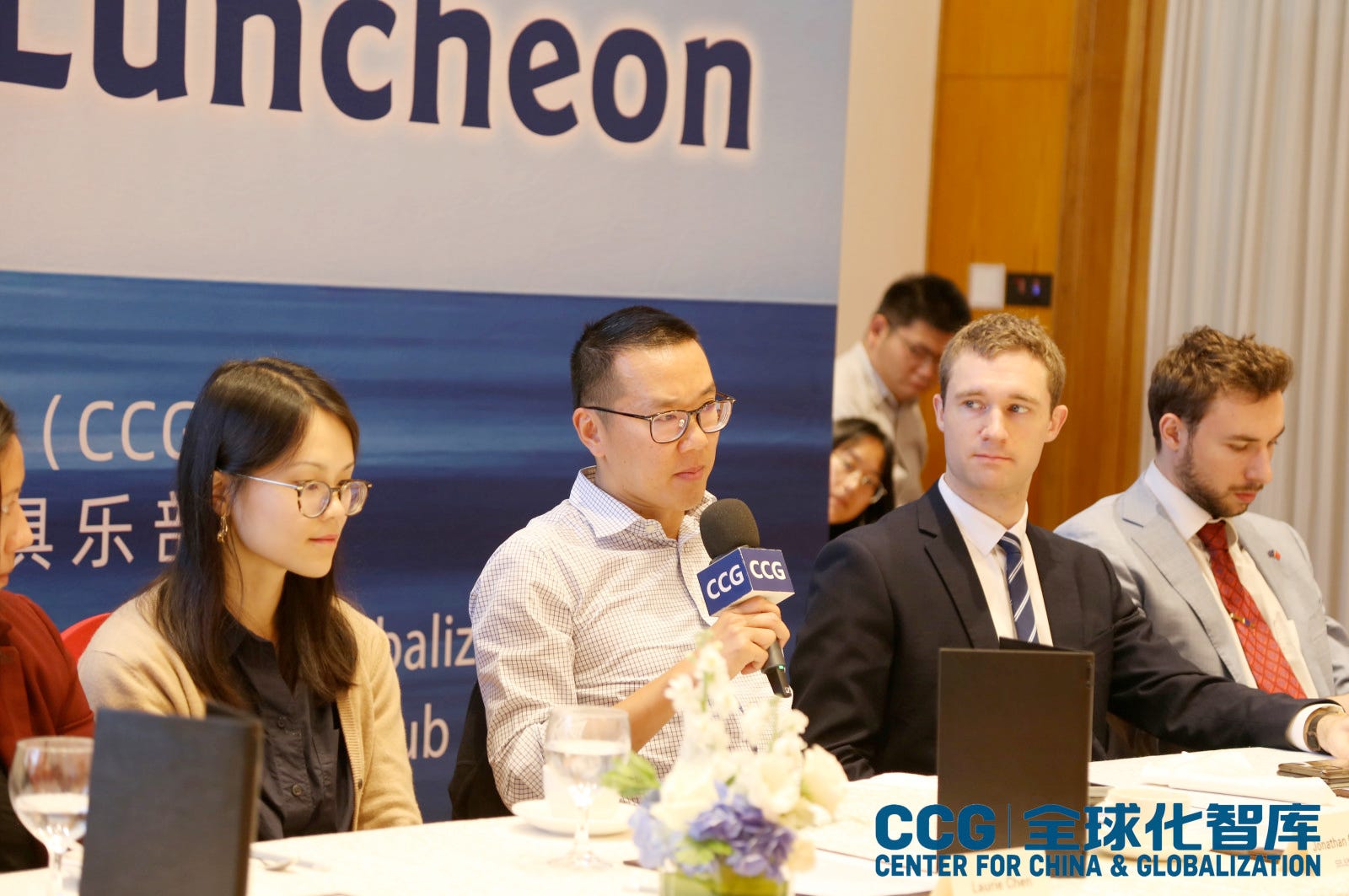Transcript of Pascal Lamy and Chinese trade experts at CCG luncheon
November 21 , 2024Leading a delegation of the Jacques Delors think tank network, the former DG of the WTO discussed green transition, subsidies, and the future of open trade.
The sixth CCG VIP Luncheon, held last Wednesday, November 6, at the historic Xianhe Hall of the Beijing International Club, featured Pascal Lamy, Coordinator of the Jacques Delors think tank network (Paris, Berlin, Brussels) and Former Director-General of the WTO. The event also brought together Chinese trade experts, ambassadors and diplomats stationed in China, representatives from multinational corporations and chambers of commerce, as well as journalists.
▲ Luncheon Video
The event was moderated by Henry Huiyao Wang, President of CCG and Mabel Lu Miao, Secretary-General of CCG.
Mabel Lu Miao, Secretary-General of Center for China and Globalization (CCG)
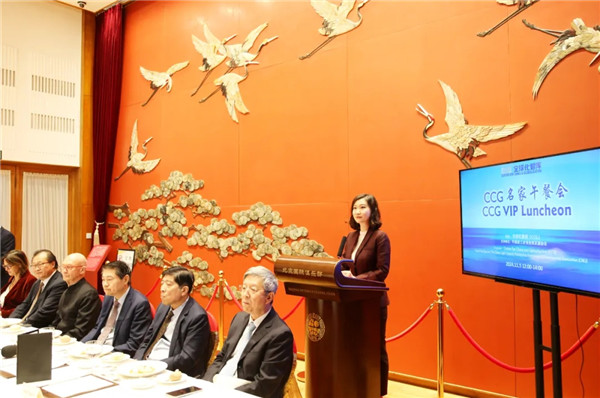
Your Excellencies, ladies and gentlemen, welcome to CCG VIP Luncheon. Thank you for joining us at today’s CCG VIP luncheon. The CCG VIP Luncheon Series is initiated and hosted by the Center for China and Globalization, CCG. This event aims to share China’s largest developments with the the embassies in China, international organizations, chambers of commerce, multinational companies, and academic experts. It is a high-end platform for international exchange, providing insights into China’s development and exploring global cooperation opportunities. Today’s luncheon will focus on the opportunities and challenges of green trade. We will explore related issues and conduct the analysis together. We are honored to have distinguished speakers, who will share their insights and perspectives with us later.
First, please allow me to introduce our keynote speaker for today, Pascal Lamy, Coordinator of the Jacques Delors think tanks network, as well as the well-known title, former Director-General of WTO. Welcome, Mr. Pascal Lamy.
Before we start, let’s take a moment to acknowledge some of our special guests and VIPs who are here. We have invited many distinguished ambassadors to China. They are:
-
John Busuttil, ambassador of Malta to China
-
Kārlis Eihenbaums, ambassador of Latvia to China
-
Assem Hanafi, ambassador of Egypt to China
-
Hussam Al Husseini, ambassador of Jordan to China
-
Paulo Jorge Nascimento, ambassador of Portugal to China
-
Marta Betanzos Roig, Ambassador of Spain to China
And we also invited many ministers of embassies and senior diplomats to China:
-
Jean-Christian Brillant, Minister, Embassy of Canada
-
Yoshiyuki Yamada, Minister, Embassy of Japan
-
Kaja Glomm, Minister Counsellor and Deputy Head of Mission, Embassy of Norway
-
Marjut Hannonen, Head of Trade, Delegation of the European Union
-
Thomas Weithöner, Head of the Economic Department, Embassy of Germany
-
Martin Matter, Head of Economic Section, Embassy of Switzerland
-
Katarzyna Wilkowiecka, Head of the Economic Department, Embassy of Poland
-
Jennifer-Lee Pritchard, Second Secretary, Embassy of New Zealand
-
Tomas Dahlman, Counsellor of Agricultural Affairs, Embassy of Sweden
-
Atakan Ozdemir, Chief Trade Counsellor, Embassy of Turkey
-
Yifat Inbar, Minister for Economic Affairs, Embassy of Israel
-
Cristian Sokolowski, Minister, Embassy of Argentina
Also, we have invited some distinguished guests from the chambers and multinational companies, including:
-
Elisa Hoerhager, Chief Representative China, BDI
-
ZHANG Lin, Chief Representative and General Manager, VDA China
-
Adam Dunnett, Secretary General, European Union Chamber of Commerce in China
-
Oliver Oehms, Delegate and Chief Representative, AHK Greater China
-
Magnus Giese, Senior Government Relations and Public Affairs Representative NIO Europe
-
Sacha Courtial, Jacques Delors think tanks network
-
Frank Niederländer, Vice President Governmental Affairs Europe, BMW
-
Nicolas Köhler-Suzuki, Associate Researcher, Jacques Delors Institute
-
Elvire Fabry, Senior Research Fellow, Jacques Delors Institute
And we have invited distinguished guests from international and domestic media in China, including:
-
Jonathan Cheng, China Bureau Chief, The Wall Street Journal
-
Laurie Chen, China Correspondent, Reuters’ Beijing bureau
-
YIN Mingyue, Reporter, China Daily
-
HONG Jianru, International Business Daily
Of course, we have invited some distinguished guests from Beijing from different departments and ministries, and non-resident senior fellows of CCG:
-
ZHOU Yunlei, Director, Department of WTO Affairs, Ministry of Commerce of China
-
HUO Jianguo, Vice Chairman, China Society for World Trade Organization Studies; Former President, Chinese Academy of International Trade and Economic Cooperation, Ministry of Commerce of China
-
TU Xinquan, Dean, Institute for WTO Studies, University of International Business and Economics (UIBE); CCG non-resident Senior Fellow
-
SUN Xiansheng, Chairman, the International Society for Energy Transition Studies (ISETS); CCG Non-resident Senior Fellow
-
HE Weiwen, CCG Senior Fellow; Former Counselor for Economic and Commercial Affairs at the Chinese Consulates General in New York and San Francisco
-
SUN Yongfu, CCG Senior Fellow; Former Director-General, Department of European Affairs, Ministry of Commerce of China; CCG non-resident Senior Fellow
-
JIN Xu, President, China Association of International Trade
On behalf of CCG, I extend a sincere welcome and heartfelt thanks to all the experts and guests today. Maybe there are more distinguished guests I haven’t introduced, but later you can have more exchanges on the table. Next, I would like to invite Mr. Wang Huiyao, who is the Founder and President of the Center for China and globalization and the former Counselor of the State Council in China, to introduce our keynote speaker. The floor is yours, Dr. Wang.
Henry Huiyao Wang, President of Center for China & Globalization
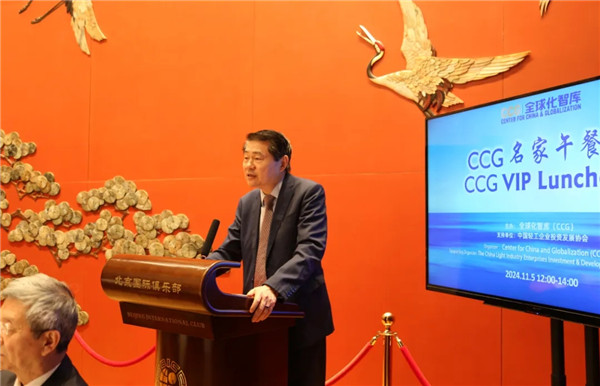
Thank you, Dr. Miao. Your Excellencies, our keynote Pascal Lamy, distinguished guests from Chinese associations, departments, international guests from the embassies, associations, industries, and companies, and our media representatives today, this is the sixth CCG VIP luncheon that we’ve held this year. This is the largest we have ever held in terms of the roundtable scale, so we can see the attractiveness of the subject we’re having today.
Actually, this morning, we had a closed door roundtable at CCG for over two and a half hours talking about managing climate technology and geopolitical transition in the European automotive value chain. Today’s luncheon is about green transition. I think it’s really a timely, relevant topic—green transition and green trade.
As we also know, this is a really critical time. We’re facing a new election imminently. Tomorrow we’ll see the U.S. election. No matter who the president is, I think we’re probably gonna have a new era in the business, economic, and geopolitical climate of the world. But this luncheon is really about China-EU collaboration on green transition and EVs. China and Europe are now talking with this subject right now, there’s a new tariff announced, China and the EU are still in negotiation discussions, and the door is still open.
Jacques Delors Institute is a very famous think tank in Europe and has networks in both Paris, Berlin, Brussels, and quite a few places. Pascal Lamy is a very old friend and he has spoken at the CCG this year and in the past. I think what we’ll do is that we’ll have Pascal give a keynote, and we have also invited quite a few Chinese experts to share their views on the subjects. Then we will open up for discussion. We have think tank representatives from Jacques Delors, Elvire and Nicholas with us today as well. So this is really a very impactful luncheon.
And I know that this afternoon, many of us, including Pascal Lamy, are going to Shanghai for the Import Expo. Tomorrow afternoon at the Shanghai Import Expo Hongqiao Forum, we’ll have another CCG forum there also on sustainable development for the green industry. So tomorrow afternoon, we’ll have a session; and then on the day after tomorrow, we’ll have an European Policy Centre-CCG project. We will have eight European think tanks, including Jacques Delors, coming to Hangzhou. We’re gonna have a discussion there in Hangzhou downtown and also at the CCG’s Yangtze River Delta Research Center in Hangzhou. So we’ll have three days of impactful discussions and a good summary for respective (Chinese government) departments as well.
Now, I’ll start with the formal presentation of Pascal Lamy. He holds various mandates at the global, European, and French level. He’s the Coordinator of Jacques Delors think tank network, which has offices in Paris, Berlin, and Brussels. He is also the Founding President of the Paris Peace Forum, Vice-President of the Paris Peace Forum, and President of the European branch of the Brunswick Group. He served two terms as the Director-General of WTO, from 2005 to 2013. Before that, he was the Trade Commissioner at the European Commission. Even before that, he had also been working at the French government at very senior posts. So he has a very impressive resume.
Pascal is a great champion for global trade, a great thinker, and also a leader in the think tank community for many creations like the Paris peace Forum. I think what Pascal would share with us is not just Jacques Delors’ latest research but also his new thinking as to how China, the EU, and the world can find a new pathway to work together towards a more sustainable future. So without further ado, let’s welcome Pascal to give us the keynote.
Pascal Lamy, Coordinator of the Jacques Delors think tanks network (Paris, Berlin, Bruxelles); Former Director-General of WTO
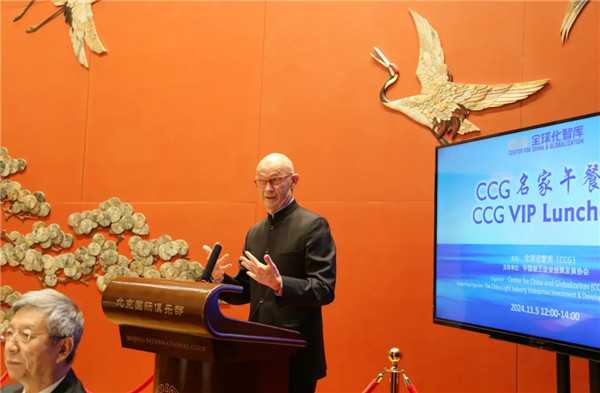
Good afternoon, ladies and gentlemen. Let me first, of course, thank my good friend Henry and the Center for China and Globalization for hosting this lunch and for asking me to share a few remarks on our topic today. I’m here with one of my 15 different hats, the one that has to do with the Institut Jacques Delors in Paris, Berlin, and Brussels. And I’m here today with a team of the Paris institute who has been working for the last six months on a big study that was commissioned with the European Association of Car Producers. We are doing this study together with Sciences Po and my good friend Arancha González, whom many of you know.
As a part of the hearings, the consultations, the input, we need to table a view of what should be in the future of the value chain structures of the European electric vehicle production. So it’s a rather specific topic. As we all know, it’s a relatively hot topic as far as EU-China relationship is concerned. The EU just decided to impose countervailing duties on exported electric vehicles from China to the EU. The EU did it according WTO rules and due process. China believes that these duties are not right according to WTO rules and due process. This is now under litigation.
That was not the point of our discussion today. The WTO adjudication system will now decide who’s right and who’s wrong. Not the point of our discussion. The point of our discussion is looking forward. Is there—and if yes, how—a more cooperative approach between the EU and China on the future structuration of electric vehicle production in Europe, with the present wave of technological change, the shift to electric mobility which we have decided, while also taking account of the next stages of that, whether it’s 5 years, 10 years, 15 years, which is automated driving. So all this is part of our picture.
And in preparing these few remarks, I remembered my conversations with Premier Zhu Rongji roughly 25 years ago when I was in charge as EU Trade Commissioner to negotiate with the Chinese authorities the terms of entry of China for the European Union. It was a long and protracted negotiation, as could be expected. And at the end of the day, I had—often in the case in this sort of negotiation—to have a tête-à-tête with a Chinese Prime Minister in order to determine the final scope of who gives what and who takes what.
I remember Premier Zhu Rongji, for whom I must say I’ve always had a lot of respect, tell me: look, my political equation is very simple. China needs to catch up. In order to do that, I know that China can do two thirds of the way, but I need foreigners to help us doing the last third of the way. I need to open China, I need foreign investment, I need foreign technology, I need foreign know-how. And this is why we have decided to join the WTO. So, that’s my case. I’m ready to pay a price for that, and I want you to understand what my equation is. So let’s finish the negotiation now that I hope you understand exactly where I am.
25 years later, it’s the other way around. We Europeans need to catch up. We Europeans know we have a number of assets; the car industry in European Union is a major and powerful one, and it has a formidable track record of innovation in the combustion area, not yet in the EV area. So the question is: how much do we Europeans rely on ourselves to manage this transition, and how much of foreign technology and investment do we need? That’s the fundamental question.
There is a series of options. The American side has chosen the “decoupling” option. We, the EU, will not choose the decoupling option. Our preferred option, as we all know, is what we call “de-risking,” which implies a level of cooperation with foreign investment and trade. The question is, can we, should we, together structure this cooperation in a way that is win-win and not win-lose? So the issue is, is there a way for such cooperation among the EU car industry moving to electric mobility?
We do not have an answer to this question, to be frank. We are looking at the various options and hence this interaction which we had this morning and which I think will help us in framing a variety of options when we finally produce our report, which is to come extremely soon.
This cooperation, if we can frame it the right way on both sides, will have to respect WTO rules. There is something we have in common with China—we have a lot of things in common—we have differences, including serious ones on some geopolitical issues, but there’s one thing we have in common, that is we want to proceed by the WTO system, which is, by the way, the reason why this duty dispute is administered, by agreement on both sides, by the WTO system, which means that there has to be a principle of a level playing field. This is a principle which, whatever solution or frame we find in future interaction in investment and trade on electric vehicles, will have to be observed by both sides. This is a point on which we have to, from the very beginning, agree: that the investment and trade relationship has to be on a proper basis of reciprocity.
In the car industry, China is not a developing country. This principle leads to, of course, giving some weight to investment and trade policy, but the EU cannot run an industrial strategy just by a trade and investment policy. What we need—and I think the present situation is a clear demonstration of that—is an industrial long-term strategy. And within this industrial long-term strategy, we organize our respiration and interaction, investment- or trade-wise, with the rest of the world—and in the case of EV, inevitably with China, given the leadership China has acquired in this area.
So that’s where we are. That’s what we are trying to do. There are still a number of explorations, which are what think tanks are paid to do. We are paid to think about these issues in as much as a holistic fashion.
I will finish this very short presentation by mentioning an issue which again surfaced in the discussion this morning and which surfaced very clearly in the first deep conversation I had last week in Brussels with a new Chinese Ambassador in Brussels, Ambassador Cai, which is this context which we in Europe had framed some time ago that the EU-China relationship has to be seen within the triptych of partnership, rivalry, and competition. I’ve been in China for already three days this week, and I’ve heard a lot, on the Chinese side, this triptych needs to be reviewed; there is too much rivalry and not enough partnership and competition. And I got this message once, twice, three times, four times. So it clearly is a message that is coordinated, as it should be, by the Chinese diplomats vis-à-vis their European counterparts.
On this, I just want our Chinese friends and our non-European friends to understand that given what is happening in Ukraine, we need—you need—to factor in this context. If you think, and if we think about how to better articulate an EU-China relationship, including in a fairly technical issue like the automotive industry, this context has to be factored in.
Please understand that for the Europeans, the invasion of Ukraine and what is happening next door on the European continent is a terrible issue. I won’t say more. I’m not going to enter into diplomatic acrobatics. But I just want to leave you with this notion that in the present circumstances, getting a proper, active, positive cooperation with China bumps into this political reality. We have to take into account what European public opinion believes. So I’ll leave it there.
We have to work and we will try to table options, if not recommendations, that paint, hopefully, a more cooperative pattern than what we’ve had recently on electric mobility. But there are also other issues which we need to have in mind to precisely determine the corridor of cooperation which we have ahead of us and which, as usual, I hope will be a bit wider in the future than it is now. Thank you for your attention.
JIN Xu, President, China Association of International Trade
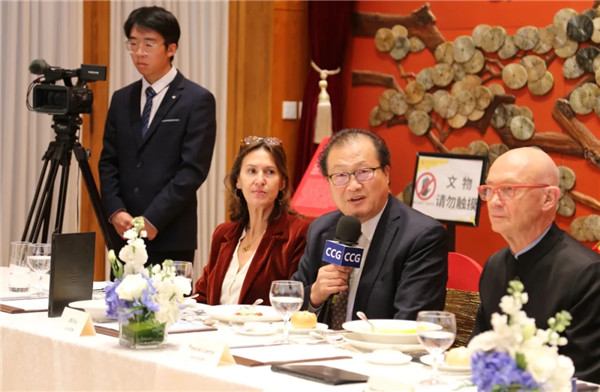
Thank you very much, Mr. Wang Huiyao, Henry. I think we had a very good time this morning. We talked a lot about our history, our difficulties, and our future. Probably late today, we can know the American election result. America is too far and Europe is much closer. And Pascal Lamy, our very old friend, came to China in 1966, right? I still remember China was the bicycle kingdom. Nowadays, if you go to the street, you can see millions of cars running on the street, but 38 years ago in China, you can only see the bicycles.
Now China has also made great achievements with the help of other countries, with the help of our European friends. And we are very thankful for your help. Today, Pascal Lamy led your delegation to China, and we talked about our difficulties. Also, we are facing some reactions. But I believe in my age, we can recite a lot of Chairman Mao’s words because Chairman Mao told us when you are in difficulties, our comrades must see our achievements, must see the light, must enhance our courage. So although we have some difficulties in our EVs, I agree with what Henry said—that’s a temporary stage and light will come soon, and let’s join our hands for our better future with everybody at present. Thank you very much.
HUO Jianguo, Vice Chairman, China Society for World Trade Organization Studies; Former President, Chinese Academy of International Trade and Economic Cooperation, Ministry of Commerce of China
Distinguished guests, ladies and gentlemen, I’m glad to attend this VIP luncheon. Pascal Lamy talked about the world trade situation. I think now this world is in disorder. Everything is in disorder. Maybe if Trump wins this election, the world will be even worse. I think the reason is we have no main principles to follow. It seems we have lost some rules-based competitions. Especially some countries always break the rule.
I notice that WTO has decided to push the reforms, but now that still seems difficult. Here, I have some idea. I think WTO reform should be divided into two parts. One is, we should concentrate on its function, because its function now is weak. So we have to strengthen the function. We need new mechanisms to make it work.
And the second part, we can talk and discuss about the rules and regulation changes for e-commerce or subsidies. We have to discuss that, but that’s in the second step. If we put all the rules changes before the WTO mechanism’s change or reform, it will become very complicated; we’ll have no way out. It’s always delayed.
At present, I think WTO’s reform is still very important. We have to concentrate on the WTO reform. There are a few key partners who should gather together to discuss the issues. If WTO reforms can go forward, I think at least world trade and investment and all the economy will benefit from it.
When the world economy is good, the rest is easy to talk about. But now the world (economy) is difficult, everything is very hard, and no one can make a friendly talk and competition. There are even cold war and bloc confrontation concepts, which seem very serious. So I think we should get some consensus on the WTO reform and together, let’s push the WTO reform. Thank you.
SUN Yongfu, CCG Senior Fellow; Former Director-General, Department of European Affairs, Ministry of Commerce of China; CCG non-resident Senior Fellow
Thank you very much. It’s my pleasure to join this VIP luncheon. Actually, personally I have known Pascal Lamy for at least 20 years because I became the Director-General of European Department of MOFCOM starting from early 2003. At that time, he was the Trade Commissioner.
We already had some trade dispute concerning solar panels and textile production. And we solved this by negotiating based on the rules of the WTO. Now we have the tension of EVs, and I hope, also in the manner of cooperation, we can solve our problem. Although the negotiation is still ongoing, I hope the result will be good for both sides.
When China joined the WTO in 2003, the share of the Chinese trade is only, I think, 4% of the global. Last year, the share of Chinese trade in goods was 14.2% at least. So the world is changing, China is changing.
I think the progress of China which has been made during the last 20 years relies very much on cooperation and our bilateral economic relations. Especially, the EU side has transferred a lot of technology to China. We have a lot of joint ventures, and here in China, we have heavy investment from Germany, France, Italy, the UK. That changed China a lot within these 20 years.
Now China has been No. 1 in trade in goods for, I think, 15 years already—from nothing to quite an important (player)—and No. 2 in GDP. I hope we can keep our good relations on track by concentrating on cooperation, maybe sometimes competition. I think competition makes progress.
China is making some progress in some technologies, especially the EVs. We tend to cooperate with our partners, some different member states of European Union. And I hope the same manner could be from the other side because you need two to tango. I think the worry is that sometimes we feel there’s too much concentration on the rivalry, but less on the competition and cooperation. I hope that will be changed. And if that attitude could be changed, the future of our bilateral relationship could be much better. Thank you very much.
Nicolas Köhler-Suzuki, Associate Researcher, Jacques Delors Institute
Thank you very much. We in this study find that the European Union’s automotive industry is really caught within a strategic triangle between three different objectives. On the one side of this triangle, the European Union wants to decarbonize. It has set very ambitious targets, much more ambitious targets than China or the United States to fully decarbonize its automotive sector by 2035.
On the other side of the strategic triangle, we have the question of competitiveness. The automotive sector is an industry that requires economies of scale, global markets to have competitiveness of its firms.
And on the third side of this triangle, we have the question of economic security. So in a fracturing geopolitical environment, there are questions about the inputs that are required for EV production, which we’re not quite as pertinent for ICE production.
The question we are asking ourselves is where are the tradeoffs between these three different sides? Where can the European Union’s automotive industry find a new way forward? I’ll let my colleague Elvire, maybe talk a little bit about some of the specific issues of these sides like competitiveness and economic security.
Elvire Fabry, Senior Research Fellow, Jacques Delors Institute
What the EU automotive industry is facing is not only progressive transformation, it’s really a revolution, because it has to deal with the legacy of an important industry, which is representing 7% of jobs within the EU. It has not only to scale up its EV production capacity and technological innovation to be competitive in that sector, but at the same time, also support the transition of this ICE industry, which is a very complex industry with very intense supply chains involving a lot of suppliers throughout Europe. So, of course, we have a concentration of those supply chains in some member states, but overall, it’s really a European interest that is at stake.
Currently, on the competitiveness side of this strategic triangle, we’re facing a slow demand within the EU for EV sales. While the demand is really strategic to create the economy of scales for the industry within the EU, still, high prices wrungs anxiety from the consumers—a lot of slowing factors that are not helping the European industry to scale up.
Those are internal challenges. But at the same time, we have those external challenges with the competitiveness that the Chinese sector has gained with huge investments since 2009—a fierce competition, very important subsidy supports.
What the EU is really focusing on is a level playing field that takes to the third side of the strategic triangle. Economic security is about reducing the over-dependencies in all those sectors, more specifically in strategic sectors. The EU is really focused on de-risking and dual-use technologies. But the weight of the automotive industry in the EU economy is so important and it is so important for social stability and political stability, that it is really a central issue for the economic security strategy of the EU.
The concern that the EU has most specifically is in the important bottlenecks that we have in supply—very important over-dependency not only to the production of batteries in China because China is producing 75% of batteries currently. And it’s not only a problem for Europe, it’s a problem for the whole world to have that concentration of production.
But in addition, because we have an important, huge bottleneck in the critical minerals supply, not so much in the mining but usually, much more importantly, in the refining stage of the supply chain. This is really a challenge to increasing the capacity of the EU in the production of batteries beyond the late stage, in which we still are, to reach the fourth generation of batteries.
Just the last words. We’re focusing a lot today on the EV sector, and the implementation of the tariffs on the EU side is an important initiative. I mean, it has raised enough discussion within the EU and then in bilateral relations. But we have to consider that it’s really the beginning of the European strategy, and the way we’re gonna calibrate this European industrial strategy and overall support to the EU automotive industry is also saying something about how the EU will also address similar issues that we have in other industrial sectors.
So if we’re talking about win-win cooperation and relations, as was mentioned before—to tango, we need be two—we need also to have on the Chinese side very concrete proposals and engagements. And it was very interesting this morning to have those mentions about joint ventures, cooperation, even in third countries. We need to be very concrete and build on that and even think beyond the EV issue.
TU Xinquan, Dean, Institute for WTO Studies, University of International Business and Economics (UIBE); CCG non-resident Senior Fellow
Thank you. I didn’t expect this opportunity. As we have discussed this morning, I believe right now, the positions of Chinese and European automakers have changed compared with the 1980s and 1990s. As I suggested, we could maybe have a different direction of cooperation.
In the past, we had help from European companies. Actually, the important basis of Chinese automotive industry was helped by the European companies. But now, some Chinese companies are leading in the EV sector and especially EV technology. So I think as mentioned by other experts, right now, Chinese companies could work with European counterparts to share our technologies and expertise with European companies.
Another suggestion that I also mentioned in another Track-II dialogue between the U.S. and China is that probably, Chinese and European companies could work together in exploring and developing third markets. China, the U.S., and the EU are not the whole world, right? There are a lot of other places and other opportunities. The U.S. and China also have this problem in the EV sector. But if we have developed an even larger market, then the direct competition will be diluted to some extent.
Another thing is that the decarbonization is a global necessity. And actually, just a few days ago, I gave a lecture to a group of African countries. They also said that they very much welcome Chinese EVs to be exported to them. They could skip over the ICE industry directly to the EV period. This would also accelerate the decarbonization process in these developing countries.
Europe and China have their own comparative advantages in doing this, because you also have very historical and long-term relationship with Africa, Latin America, and Central Asia. But China also has its own advantages. So we could work together to develop those new markets. Thank you.
ZHOU Yunlei, Director, Department of WTO Affairs, Ministry of Commerce of China
Thank you very much. Very honored to be here to attend this VIP luncheon. Just in the morning, we had a very fruitful, constructive discussion about how to solve the problem now faced by Europe and China. This kind of discussion makes me recall my previous experience in the WTO. Actually, we had a lot of discussions about how to deal with the green policies implemented by the members.
Just as Nicolas and his group have a very constructive report about the triangles of the different dimensions to reflect on the EU-China problems, we also have discussions in the WTO, that is, how to measure the green policies, such as subsidy policies in green transition in each country—the European Union’s Green Deal policy is very famous.
Members have a lot of discussions, seminars about the impact of industrial policy—how to measure the trade impact and also the environmental impact of such kind of policy. That’s why now the DG says that WTO should advance with time and we should talk about the trade impact of climate policies.
Members have, to some extent, reached consensus that first, each kind of green policies, in whichever forms, should strictly abide by the WTO rules. Second, we should try our best to minimize the negative trade effect of the green policies. Climate goals are issues or challenges faced by all the nations. We should call on the WTO members’ collective efforts. This is very important.
So just for my perspective, green competition is a race to the top, but the protectionism and tariff is a race to the very bottom. So we think that the cooperation between China and Europe is the only way out. Thank you.
Henry Huiyao Wang, President of Center for China & Globalization
Thank you, Director Zhou from the WTO Department of MOFCOM. I think it’s really interesting.
Just to share a bit of my thinking. I think we had a very productive joint discussion by CCG and Jacques Delors think tank network. I find that we were having some proposals, particularly from CCG experts, that there’s a third market. There’s a big global market for China and EU automakers to work together, so we can have a more positive narrative rather than just negative. This is one proposal we reached this morning.
The other thing we were talking about is what Elisa (Hoerhager, Chief Representative China, Federation of German Industries) mentioned. This year, we had a record level of German investment in China, and half of that is in the auto industry. So you see, the companies are voting by their actions. They still have big trust in the Chinese market. China’s EV market is the most competitive, most dynamic, and the largest application of EV technology, value chain, and synergy in the world. If you want to conquer the world, you have to conquer the Chinese market first. And that’s why all those European automakers know that to harness the state-of-the-art technology, China is a must-market to attend.
In that sense, 40 years ago, we had a lot of German and European companies come to China and JV with China. Now it’s time Chinese company made joint ventures with European companies back in Germany, Europe, Africa, Latin America, and Central Asia. So if we change the narrative, we really have a more positive attitude there.
I really think the companies are not stupid. I mean, they know what’s going on. If they are still investing heavily in the Chinese market, that means something. I hope that we have a very good report.
I know Frank is from BMW, based in Brussels. I don’t know if you want to share a bit as well.
Frank Niederländer, Vice President Governmental Affairs Europe, BMW
Thank you, Henry, for inviting me, and I also appreciate the discussion we had this morning. We mentioned it several times that we see a huge transformation in the car industry on the one hand, and on the other hand, we have discussion about the competition. Mostly discussion now is about the element of the fair competition versus the cooperation element.
Historically, we look to China—and I can talk for our company—it had been a huge period of cooperation. I remember times when I had been here, 2004, when the automotive industry and the market started. And I remember the figures, the total market was 800,000 cars a year, which is now our sales number in China. So you have seen a huge transformation. And the whole industry—let’s say the success—that Pascal mentioned it at the beginning was cooperation and also bringing technology to China, bringing production to China, and by that, helping also to ramp up the industry here.
The issue right now—and that’s a big challenge not only for the industry but also for the region—is how to manage this triangle we were talking of. We are all about reaching the 2050 Paris targets. So that’s the overarching element we want to look at. It’s about changing technologies to do that, but it’s also about how to manage that transition in a tension between the technology element, the customer, and the market.
And of course—I think that’s a key element—it won’t be a win-win situation for all. In every technology transition—you can take the technology one, you can take as solar panels, whatever, you name it—you have always companies winning on that and other losing on that. I think that’s the key challenge, which currently is mainly the discussion in Europe because it’s that element of economic security. If we manage to, let’s say, make the transformation by getting growths, on-shoring production, and enhancing prosperity while decarbonization of the industry at the same time, that would be a success story.
The current one is more the fear of a threat that we have had in the last five years in the EU Green Deal discussion, mainly, the focus on transition and less on the competitive side. I know that the Covid period had an additional element to do that because we lost a little bit track of what was happening. A lot of people came to China after Covid and suddenly it appeared to them how the technology advancement had happened in those three years period of time.
Now it’s the element of how to ramp up, how to accept there that there is a leadership difference on the technology side, where we should cope together. But we must also see that the whole topic of the industry and regulation, government incentive is much more complex on that. It’s not region versus region.
We have that China tariff issue, and I try to repeat that. We have a cooperation bringing cars from China to Europe, and we have higher tariffs being a European company than most of the Chinese ones. That shows that there’s a much bigger complexity in the whole system, finding the right balance, finding an agreement on how you address global subsidies, how to cooperate while being competitors. And that’s a new discussion we try to bridge and engage in.
The key element to finish is really how to focus more on the cooperation options than on, let’s say, the rivalry one and the threat one. We need positive narrative, especially for Europe. Probably, believe more in us, and by that, be more able to cooperate with China on that.
Q&A
Assem Hanafi, Ambassador of Egypt to China
Thank you very much, Dr. Wang. And I join my colleagues in the expressing our appreciation for inviting us to this very august event. I listened with the great attention and gratitude to all the remarks mentioned before. We, the developing countries, are part of this world, and whatever happens between China and European Union is of impact to us as well.
I totally agree with the speakers before me on some decarbonization measures. This Carbon Border Adjustment Mechanism would be imposed on our exports to the European Union beginning in 2026, if I’m not mistaken. I personally understand that there is a drive towards climate action and green transition. Of course, we share with many European countries the need for a more green world and more environmentally friendly industries.
But this transition in our case would take long and it’s a very costly process. And it’s very detrimental to our export at the moment. A substantial percentage of our exports is to the European Union—to our neighborhood. Not speaking only for myself, for Egypt, this has been raised time and again by many of our partners in the Global South. So I just wanted to hear Mr. Lamy’s advice. We are already engaged in discussions with European partners and the EU level of experts, but I would appreciate it to hear his advice on the way forward on this very important issue.
Hussam Al Husseini, Ambassador of Jordan
Thank you. And again, thank you, Henry and Mabel for this another interesting debate and lunch, and especially with our respective guest speaker, Mr. Lamy, whom always I’ve admired during his both missions in the EU Commission and the WTO. And that brings me actually to my comment and then my question.
Well, you know, we are used to coming to your luncheon, Henry and Mabel, to relax from our diplomatic pressure and listen to the experts and our guests, away from diplomatic constraints and so on. But I have to admit that today I’ve listened to too much diplomacy than I’d expected on these issues. We were all looking forward to hearing some frank and strong opinions about what’s really happening now and what the world is facing.
I’m saying this because my country, Jordan, has a very special relations with the EU. We have an advanced status with the EU. We have excellent relations, including preferential treatment for trade, investment, and so on. So is this the case with China, where we have a strategic partnership also with China.
When we look at our exports to Europe, it’s so limited simply because of so many non-tariff regulations, including rules of origin and so on, which makes it really not only a dream, but sometimes very difficult and even impossible to penetrate to the European market.
When we look at the Chinese example, we see where all these regulations are fit, are met, and then suddenly, there come in new regulations or a new situation. These highly competitive products coming from China are now facing new walls, I would say, to intercept the interference.
Now I’m a little bit puzzled. Before we enter the market, we have a lot of those regulations that look like walls. And when we break all these walls, new walls will be erected. This is how I see it from my point of view.
I want to go directly to my question, because we are frustrated from the already existing war against international law in terms of peace and security in the world, which, especially my country, my region are facing now. We are facing something that is everybody is talking about now—the new narrative, new concept of rules-based order, which is a way to evade and to depart from the international legitimacy and international law that has been agreed for so long in terms of the United Nations and many other entities. Are we moving toward a new rules-based trade order in the same sense that we’ll be departing from what we already have been agreeing upon in the WTO and other trade international negotiations? Are we moving in that direction? Because if we are moving in that direction, what’s the use of all of these institutions, including the WTO?
This morning, I saw an interview for the current Director-General of the WTO. She was saying 75% of the world trade is based on WTO rules. Now, what worries me now is the 25%. Are they going to decrease or increase? And in that sense, what will be the future? Are we going to face again a new rules-based trade order that will depart from all our commitments and that we will have to face now shockingly against our interests, especially as developing countries? Thank you again.
HE Weiwen, CCG Senior Fellow; Former Counselor for Economic and Commercial Affairs at the Chinese Consulates General in New York and San Francisco
Thank you. Now I would like to say another thing. As the Senior Vice Chairman of the Global Alliance of SMEs (GASME), I am glad to say that we will launch a major event later this month in Hangzhou—Global Industry Cooperation Conference—in which the European Union Chamber of Commerce in China will be a key player and the American Chamber of Commerce in Shanghai will be a supporter. It will be attended by Global 500 companies and by companies from Europe, America, Japan, Asia, and elsewhere. We will issue an initiative and join hands to support globalization and a multilateral trading system.
I hope that all of us, Europe, China, and other countries, your honorable ambassadors, representatives, will also join us to support globalization and a multilateral trading system because we are meeting with headwinds in the global economy. Only by upholding the globalization and multilateral trading system can we meet the 2030 sustainable development goal set by the United Nations. So let’s work together. Thank you.
Pascal Lamy
Let me make three short points answering to what has been said. First, I’d like to rebound a bit on what Frank Niederländer from BMW said. Yes, we had, 20 years ago, 30 years ago in the car industry, a cooperative relationship between the U.S. and China. But let’s remember, under Chinese rules, when the EU car industry decided to go to the Chinese market with its vast promises, China said, okay, welcome, but with two conditions, 1) joint ventures in which we will keep a majority for 10, 15, 20 years; 2) second, technology transfers.
So it was a cooperative model, but under rather precise conditions. The cooperative model was not just open, it was open under some conditions. And I think we need to have this in mind if we try to emulate what happened at the time with a new cooperative system, where China has a technological leadership. And I think this conversation shows that maybe a model of this kind could be on the table.
I’m not saying it should be. We have not totally finished our study. But in a way, yes to a new cooperation pattern in this industry, but there will have to be some rules of the game as there were thirty years ago, when we, the EU, started penetrating the Chinese market.
On the question by the Ambassador of Egypt, that’s a very wide issue, which is: how do you combine trade opening, basically the WTO system, and greening our economy in a way we are all committed to open trade, and we are all committed to decarbonize? How do we articulate these two elements? This is a very complex issue internationally, for one reason which I have discovered, having switched part of my activities from trade and economy, international economy, to environmental protection.
WTO works with trade opening via multilaterally determined contributions (MDCs). If you want to open trade in the WTO, you go around the table—you will do this, you will do this, you will do that, you will do that. At the end of the day, the sum of what we decide to do together will be multilaterally determined. We will all agree that you do this, you do this, including special and different treatment. On the environment side, it’s totally different. We’ve decided to go there by nationally determined contributions (NDCs). And this creates a tension in the system because nationally determined contributions translate into different objectives, different timing, different trajectories, different instruments, including instruments that have an impact on trade. If we price carbon at 100 euros a ton in the European Union, of course we have a problem trading with countries who price carbon at 5 or 10. This is inevitable.
So we have organized our international system, which in a way that implies a coexistence between MDCs on the one side, NDCs on the other side, with a necessity to resolve this inbuilt contradiction which we have created. We haven’t built a Paris agreement in 2015 saying we will multilaterally determine the contribution of each country to decarbonation—we have a carbon budget and you do this, you do this, you do this…and at the end of the day, we agree that this is the way to go.
Sorry for this bit of an abstract approach, but I think trade won’t have a proper understanding the way environment decarbonation works and decarbonation won’t have a proper understanding how trade works. So we have to build this bridge.
Now, back to the thrust of your question, in the case of the EU, yes, we have decided to green more rapidly than others, and that’s our own political decision because this is what European public opinion decided we should do. This was not invented by whatever our sort of god; it stems from the collective preference of the Europeans to move forward in greening the economy. We’ve chosen to do that mostly through carbon pricing, hence this issue, which necessitates a border adjustment so that the EU production systems which are imposed 100 euros a ton of carbon emitted do not go elsewhere, which would have zero impact on the environment. That could be a carbon leak. They would emit carbon elsewhere at a lower price. So we have to have a system like this.
I would be less affirmative about the famous deforestation directive. In the case of the CBAM, there’s been a lot of tests, a lot of consultations, a lot of messaging, which is why it was basically decided three years ago and it will only enter into force in 2026. As you know, a number of details of how you measure the carbon footprint for the few products that will enter into this carbon border adjustment at the beginning, which is steel, aluminium, electricity, fertilizers—this is done very progressively.
But I recognize that this is not the whole story. The Institut Jacques Delors in Brussels who’s specialized on the Green Deal, and who by the way published the first CBAM template in the spring of 2020—that’s a long time ago, and the EU Commission used a lot of this template for its final CBAM decision, together with the member states and European Parliament.
We’ve also been very loud on the fact that until recently, the EU was focusing too much on the trade-environment, whereas it should focus on the trade-environment-development dimension. This concept is now known in Brussels as “le triangle.” And we’ve tried to convince so far rather successfully that instead of doing things in silos within the Commission, they should do it in a more holistic way, factoring in, including the development dimension, meaning roughly to redirect part of the EU development and technical assistance to programs that help developing countries matching the new green standards, which by the way are not just on industry, but are also more and more on agriculture, even if the EU is much slower than we would have wished in greening its own agrifood system.
So my answer to your question is, you’re absolutely right. This dimension has to be factored in. That’s probably one of the reasons why the deforestation directive, which is not a big problem for Egypt, but which is probably a larger problem for other more forested countries, will be delayed for some time in order to be technically cleaned and broomed. And I think it’s a dire need to do that. So you’re right. The question is now, how do we solve this issue within a triangle?
On the last question about the WTO rules-based system, as I said in my few remarks, the EU—and I’m not speaking for the EU, I’m independent, including here—will abide by WTO rules. This is clear. It’s a decision in principle. I mean, our DNA is rules-based. The way we’ve constructed European Union is rules-based, which is why, by the way, people like Frank Niederländer complain that we are to ruly, we are making too many rules. It’s always about rules and rules. Yeah, we are rules-based and sometimes maybe over rules-based. That’s another question.
So we will always abide by the WTO rules as we did by the way, on these countervailing duties, which have been built and calculated according to the very precise dispositions of the ASCM, of the Agreement on Subsidies and Countervailing Measures, which is one of the pillars of the WTO rulebook.
Now, China disagrees with that. China believes we’ve wrongly calculated our numbers. Again, this would be adjudicated, the good news being that this will be adjudicated between the EU and China according to WTO rules.
Now, of course, we have an elephant in the room, which is the U.S., who basically, have decided to go on strike. And my answer to your question whether international trade will remain rules-based for the moment is, I think it will remain rules-based for the EU, China, and the big shot. I’m sure it’s the same for Canada, Australia, the United Kingdom, Chile, Singapore, and New Zealand. What I see is that the U.S. are now dispensed from observing WTO rules. They have decided that the price of WTO conformity, according to their geoeconomic and geopolitical objectives, is too high.
Now, can we, medium- and long-term, have a WTO rule-based system without the U.S.? Maybe. But I would not speculate too much at this stage, especially on the eve of a U.S. election which we know might bring a bit of a different stance on this, although I’m among those who look at the details on trade issues and I haven’t seen much of a difference between Mr. Biden’s trade policy and Mr. Trump’s trade policy. This is a more general issue. The U.S. have moved protectionist. That’s a fact. They have their own reasons to do that. But, which is why my answer to your question is nuanced: if it’s about the EU or China—I’m not speaking for China, but my guess is that they will because they also know the value of a rules-based insurance policy. If China was not in the WTO, China’s exports would be bashed in the world of today by whatever tariff, like, by the way, the U.S. do it. I think that shows the difference.
But for the future, we have to think more seriously. If the U.S. maintain this distance, how can we run an international trading system with one of the elephants of world trade outside of the zoo?
TU Xinquan
Thank you. As Elvire mentioned, the transition from the old fuel cars to the EVs is like a revolution. It is really revolutionary because right now, EVs are like a combination of cars and smartphones. So the success of Chinese EV makers is at least partly due to the well-developed ICT industries in China. I think China and EU should also have more collaboration in the ICT industry.
Huawei has become a very important enabler to some Chinese EV makers. It is already a very important player. But right now, as you know, the EU has some restrictions on the ICT industry, especially Huawei and ASML’s chip machine exports to China. Do you think that it is possible for the two sides to have more cooperation or to deal with the restrictions? Thank you.
Jonathan Cheng, China Bureau Chief, The Wall Street Journal
Thank you. This was a very thought-provoking lunch. So thank you for sharing your thoughts with us. I’m still thinking through everything that has been said here, but one question that comes to mind, and maybe it’s little more provocative, but it seems to me like if we’re not already there, we may be moving in the direction that China becomes the loudest or the most prominent advocate for the current system—I mean, if the U.S. election goes a certain direction especially.
First of all, do you think that is the case that China may become the most prominent advocate on the global stage of the current system? To what degree—and this, I guess, is the provocative part—is it because China has kind of won under the current system? I mean, they joined just a couple decades ago but they’ve managed to gain the most from it. And now the U.S. doesn’t want in anymore because they’re not winning from it, and perhaps Europe is going the same way? Is that how you see things?
Pascal Lamy
For the moment, we are focused on EVs as a hardware tech jump. We’re not yet focused on EVs as a software. That will come later. And it raises a different set of issues which have to do with data collection, data availability, data privacy, data storage. As we all know, the U.S. have not only decided to put a 100% tariff on Chinese EVs, but they are banning Chinese software on EVs for the U.S. for reasons that have to do with their sensitivity on data. Now, whether China, for instance, would accept Western software on cars circulating in China and pumping data everywhere remains to be seen. We all have our sort of a national security interest.
This problem will come. I worked a lot on the global governance of digital ecosystems, including now artificial intelligence, including preparing this French summit that will take place on AI in February. My own conviction at this stage is that there will be no convergence in the digital world, the sort of which we had in the previous world. We had convergence in the way we would produce shoes, shirts, and cars; cars are produced, as I see, in the same way everywhere. So we have huge economies of scale and we have similar technologies and their diffusion. The digital system is different. We will have much less convergence and we will have to organize more of coexistence. And the issue is how you organize coexistence, because our collective preferences, as far as data are concerned, are extremely different. The U.S. is not dealing with this like EU, EU is not dealing with this like China, and India will probably deal with that in its own way.
By the way, I’ve heard very interesting development this morning about EV development in China, the EU, and the U.S., factoring in India at some stage in the equation—I think it is necessary; it’s coming big way in this direction. So let’s work as openly as possible on the hardware part of the equation, knowing that the software part will have to be properly prepared in order to take into account the inevitable differences in the way we deal with data.
On the question of whether China will remain the only supporter of open rules-based system, I would put it on the other way around. The other way around is, will the U.S. be the only one to exit the system? Because as far as I know, I’m talking to a lot of African, Latin American, and Asian countries, they like a rules-based trading system.
Now, of course, they don’t take a very prominent position in the WTO given the U.S.’ influence on many of them, but the question is not whether a vast majority of developing countries still need a rules-based system. A rules-based system for developing countries is in a way protecting them because of their weaker capacity to compete. They have rights, schedules, or time implementations, which others do not have.
So I think the issue is really, will the U.S. remain out of the system while imposing protectionist policies? Either in the name of national security with this sort of a “small yard, high fence,” which I’ve always found an extremely clever trick of how to present the thing because you keep the whole margin of manoeuvre and how high is the fence and how large is the yard. Really, the guy who invented that is very clever and I would love to have done that at some stage, found such a clever way of keeping all my options open while providing with a nice picture.
Or whether it would be Trump-like, which is starting from a totally absurd economic belief, which is that the U.S. trade deficit is a problem for the U.S. and shows that the U.S. lost and the others won. Excuse me, but this is absolute crap. The reason why the U.S. have such a large deficit is that they undersave and overspend—the other way around in China, by the way—but they have the dollar. So, as long as you can finance a trade deficit, the trade deficit is not a problem. And they can finance a trade deficit because they just have to print dollars. So the notion that the U.S. trade deficit is a weakness for the US is not (true).
And this leads me to the final part of the question. Did China win? Of course, China won, but we all won, because the notion that trade opening is one win, one lose does not reflect the reality. If you look at how, until recently—I’m not saying it’s the case now, but if you look at the way the Chinese trade surplus moved from the moment it joined the WTO to, let’s say, 2010 or 2015, it shrunk. It has regrown since, but it shrunk. And if it shrunk, it means that China imported more than it exported.
So I think the example of China, and I’m not saying China did everything right, nor, by the way, do I believe that the WTO rules is enough of a rules-based system. If you take the rules of WTO on subsidies, for instance, they are incredibly weak as compared to the use of this instrument 30 years ago, 20 years ago, 10 years ago, and now they have become a major element of all industrial policies. So the WTO system is way from properly ruling everything that has to be ruled to ensure a level playing field, taking into account the position of developing countries.
I’ve said every time and acknowledged that even in my case, I did a mistake. Collectively, let’s say, the U.S., Japan, and myself at the time, did a mistake when the question was whether before China would join the WTO, we should narrow the stitches of the net of disciplines on subsidies in WTO. This question was raised at the time. We, with U.S. and Japan, looked at this issue. And our lawyers told us that’s dangerous: if you start narrowing the disciplines on subsidies, some of our subsidies, the U.S., the EU, Japan, will be caught; so better keep the net with large stitches. We wrongly listened to them. We did not narrow the stitches of the net before China joined, because we were blind to the future of China. None of us at the time would have ever imagined that China would have the huge capacity to subsidize as it has now, which is why, in some cases, China cheated with the rules of WTO, and it was taken to dispute, and it lost, and it abided by the adjudication. In many cases, China is cleverly using the threads of the nets in the WTO.
So again, I don’t think it’s just that China won. China won. We all won. The way we distributed the paying part of the Schumpeterian equation of opening trade is a different story. In my view, it’s no coincidence that the U.S., who have a relatively modest welfare system as compared to their GNP per head, did not properly cushion the Schumpeterian impact of trade opening on a number of their industrial sectors. But I know this is the view of an old social democrat monkey.
Note: The above text is the output of transcribing from an audio recording. It is posted as a reference for the discussion.
Topical News See more

